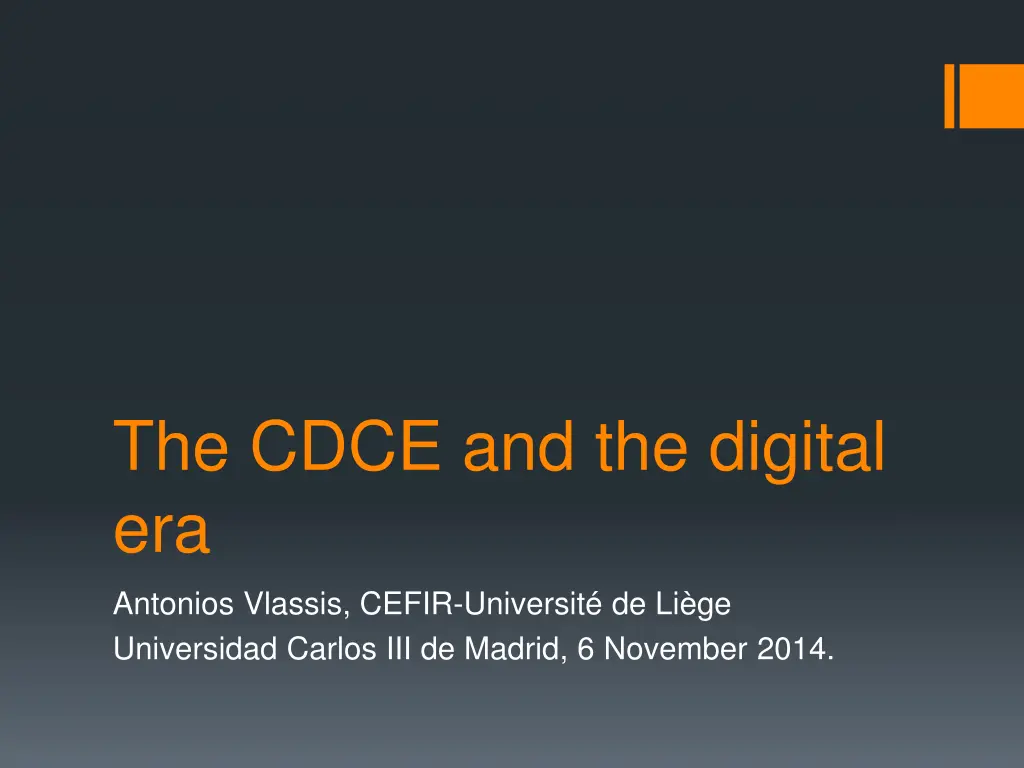
Understanding Cultural Trade Agreements and Cooperation in the Digital Era
Explore the impact of recent trade agreements on cultural goods and services, the role of international cultural cooperation through the International Fund for Cultural Diversity, and the involvement of civil society in cultural development discussions. Learn about strategies for including cultural industries in trade agreements and the challenges facing the implementation of cultural development programs.
Download Presentation

Please find below an Image/Link to download the presentation.
The content on the website is provided AS IS for your information and personal use only. It may not be sold, licensed, or shared on other websites without obtaining consent from the author. If you encounter any issues during the download, it is possible that the publisher has removed the file from their server.
You are allowed to download the files provided on this website for personal or commercial use, subject to the condition that they are used lawfully. All files are the property of their respective owners.
The content on the website is provided AS IS for your information and personal use only. It may not be sold, licensed, or shared on other websites without obtaining consent from the author.
E N D
Presentation Transcript
The CDCE and the digital era Antonios Vlassis, CEFIR-Universit de Li ge Universidad Carlos III de Madrid, 6 November 2014.
Three main points The recent trade agreements and the treatment of cultural goods and services. The international cultural cooperation and the International Fund for Cultural Diversity. The participation of civil society within the Conference of Parties and the Intergovernmental Committee.
Trade agreements 1990s: GATS-WTO, NAFTA, MAI-OECD and the cultural exception 2000s: bilateral agreements of US, Protocol of cultural cooperation by EU. 2013: the new approach of cultural exception (EU-Canada) Four strategies The inclusion of audiovisual and cultural services. The total exclusion of cultural industries (typical cultural exception) The chapter by chapter exception. The Protocol of cultural cooperation. Recent trade negotiations (TPP, TTIP) and digital audiovisual services (video on demand, catch-up television). Towards a new strategy beyond the zero-sum approach? Towards a separate chapter Culture and Trade
International cultural cooperation and the IFCD The IFCD is one of the main tools of the CDCE for promoting the development of cultural industries in developing countries. 71 projects from 43 developing countries with US$ 4.3 million in funding. Total received contributions $US 6.6 million (asymmetry and irregularity). Three main issues of the IFCD implementation Major identity problem of the CDCE: Confusion and misunderstanding about scope and objectives of the CDCE. Identification of the programs dedicated to the cultural development. Ex. Aides aux cinemas du monde, Euromed Audiovisual, Media Mundus, ACPCultures+, Francophone Fund, IBERMEDIA. Better synergy and coherence among the multilateral funds (prevent the overlapping). Inclusion of the culture in the post-2015 development agenda? Unlikely.
Civil society and CDCE The CDEC recognizes the fundamental role of the civil society, BUT who participates in the multilateral debate? 13 meetings of CDCE Conference and of Committee: in total 42 NGOs ; only 3 NGOs participated in all the meetings ; 31 NGOs participated four times or less (irregularity); monolithic participation (developed countries and culture NGOs). Three issues: Geographical diversification of the CDCE civil society Thematic diversification of the CDCE civil society Make the CDCE implementation more vital and dynamic.
